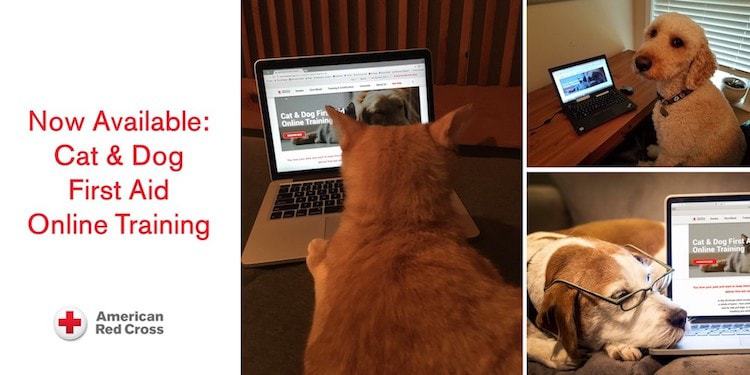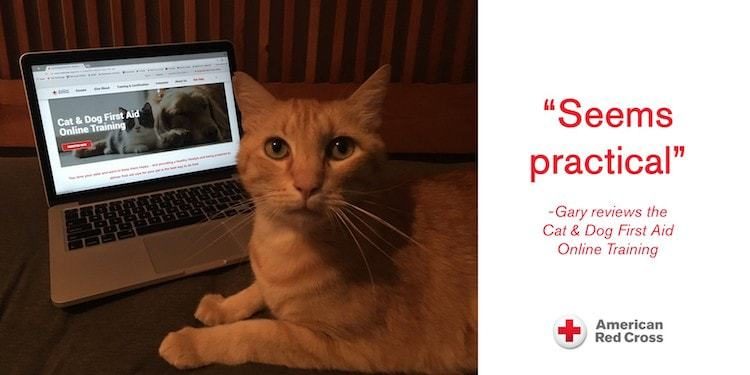Back in April, we interviewed Dr. Mandell about Pet First Aid. Since it’s summer and temperatures have been soaring throughout the nation, we asked Dr. Mandell some questions about how to keep your pets safe during this hot summer season. Dr. Mandell also tells us about a helpful Cat & Dog First Aid Online Training course and a very handy Pet First Aid App, that’ll help pet owners be better prepared for a pet emergency.
When do you know it’s too hot outside for pets?
Pets can vary as to how much heat they can tolerate- but a general good rule is -if it’s too hot for you, it is too hot for them.
It will also depend on if they have access to shade and fresh, cool water. Dogs dissipate heat through panting. There are some dog breeds who will be less tolerant of the heat, such as brachycephalic- or pets with short noses (like bulldogs, pugs, Frenchies, etc.). These dogs can get overheated very quickly because their ability to pant and get rid of heat is hindered by the anatomy of their upper airway.
What are the best ways to keep your outdoor pet safe in the heat?
Since dogs can’t tell you that they are getting overheated, you have to look for signs that they have had enough. If he/she is panting while laying down, give him/her a break from the heat until they are breathing more comfortably.
Excessive panting and not being able to calm down, hypersalivation, difficulty breathing, gums that become brick red, an elevated heart rate, vomiting, diarrhea, and collapse are all signs of heat stroke.
If your pet is exhibiting these signs, you should take their rectal temperature and start cooling measures if the temperature is above 104 degrees F.
What can you do to cool down your overheated pet?
The best first thing to do is to cool them off by pouring cool water on them and getting them out of the heat. You can use a water hose (make sure to let the hot water run through first) or use cool water soaked towels on their head, feet, neck, chest, and abdomen. Turn a fan on a put it in front or next to them.
Then call your veterinarian to discuss the temperature and signs that he/she exhibited. Even if cooled, heat stroke can lead to other issues like clotting issues and kidney failure, so you should always contact or bring your pet to a veterinarian.
If your pet stays outside, you must make sure there is adequate shelter with dry bedding, a water source that can be cooled, and shade away from the sun. On very hot days, this may not be enough, and going inside to air conditioning or a fan source may be needed. In other words, making sure they can get away from the sun and heat is imperative, along with plenty of fresh, cool water.

Could you tell us about the cat and dog first aid online course and how this course could help pet owners during the hot summer season?
The American Red Cross Cat and Dog First Aid online course teaches owners, pet-sitters, and dog walkers to learn what is normal for their pet- gum color, heart rate, breathing rate, temperature, etc., so they can recognize when something is abnormal. It also goes through what to do for heat emergencies and other preventative care to keep your pet healthy, such as always making sure your pet is on preventative medication for external parasites like fleas and ticks, and internal parasites like intestinal worms and heartworm, which are more prevalent in the warmer months. Step-by-step instructions and visual aids for what to do if a pet is choking, needs CPR, has a wound, or is having a seizure are included along with content on including your pet in your emergency preparedness planning.
People can access the interactive course on their desktop or tablet at redcross.org/catdogfirstaid and go through the content at their own pace. It takes approximately 30 minutes to complete the course.
The free Red Cross Pet First Aid App provides instant access to expert advice for emergencies, an animal hospital locator, pet-friendly hotels, emergency preparedness content and more.
Thank you to Dr. Mandell for answering our interview questions! Deborah C. Mandell, VMD, DACVECC, is a member of the American Red Cross Scientific Advisory Council, and professor at Matthew J. Ryan Veterinary Hospital of the University of Pennsylvania.
















